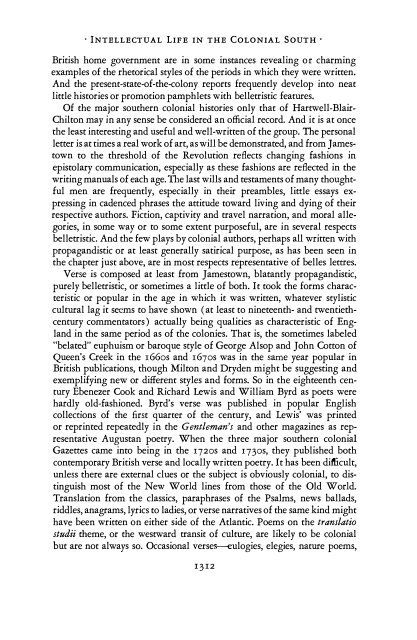Literature, Principally Belletristic - University of Tennessee, Knoxville
Literature, Principally Belletristic - University of Tennessee, Knoxville
Literature, Principally Belletristic - University of Tennessee, Knoxville
You also want an ePaper? Increase the reach of your titles
YUMPU automatically turns print PDFs into web optimized ePapers that Google loves.
· INTELLECTUAL LIFE IN THE COLONIAL SOUTH'<br />
British home government are in some instances revealing or charming<br />
examples <strong>of</strong> the rhetorical styles <strong>of</strong> the periods in which they were written.<br />
And the present-state-<strong>of</strong>-the-colony reports frequently develop into neat<br />
little histories or promotion pamphlets with belletristic features.<br />
Of the major southern colonial histories only that <strong>of</strong> Hartwell-Blair<br />
Chilton may in any sense be considered an <strong>of</strong>ficial record. And it is at once<br />
the least interesting and useful and well-written <strong>of</strong> the group. The personal<br />
letter is at times a real work <strong>of</strong> art, as will be demonstrated, and from Jamestown<br />
to the threshold <strong>of</strong> the Revolution reflects changing fashions in<br />
epistolary communication, especially as these fashions are reflected in the<br />
writing manuals <strong>of</strong> each age. TIle last wills and testaments <strong>of</strong> many thought<br />
ful men are frequently, especially in their preambles, little essays ex<br />
pressing in cadenced phrases the attitude toward living and dying <strong>of</strong> their<br />
respective authors. Fiction, captivity and travel narration, and moral alle<br />
gories, in some way or to some extent purposeful, are in several respects<br />
belletristic. And the few plays by colonial authors, perhaps all written with<br />
propagandistic or at least generally satirical purpose, as has been seen in<br />
the chapter just above, are in most respects representative <strong>of</strong> belles lettres.<br />
Verse is composed at least from Jamestown, blatantly propagandistic,<br />
purely belletristic, or sometimes a little <strong>of</strong> both. It took the forms charac<br />
teristic or popular in the age in which it was written, whatever stylistic<br />
cultural lag it seems to have shown (at least to nineteenth- and twentieth<br />
century commentators) actually being qualities as characteristic <strong>of</strong> Eng<br />
land in the same period as <strong>of</strong> the colonies. That is, the sometimes labeled<br />
"belated" euphuism or baroque style <strong>of</strong> George Alsop and John Cotton <strong>of</strong><br />
Queen's Creek in the 1660s and 1670S was in the same year popular in<br />
British publications, though Milton and Dryden might be suggesting and<br />
exemplifying new or different styles and forms. So in the eighteenth century<br />
Ebenezer Cook and Richard Lewis and William Byrd as poets were<br />
hardly old-fashioned. Byrd's verse was published in popular English<br />
collections <strong>of</strong> the first quarter <strong>of</strong> the century, and Lewis' was printed<br />
or reprinted repeatedly in the Gentleman's and other magazines as rep<br />
resentative Augustan poetry. When the three major southern colonial<br />
Gazettes came into being in the 1720S and 1730s, they published both<br />
contemporary British verse and locally written poetry. It has been difficult,<br />
unless there are external clues or the subject is obviously colonial, to dis<br />
tinguish most <strong>of</strong> the New W orId lines from those <strong>of</strong> the Old W orId.<br />
Translation from the classics, paraphrases <strong>of</strong> the Psalms, news ballads,<br />
riddles, anagrams, lyrics to ladies, or verse narratives <strong>of</strong> the same kind might<br />
have been written on either side <strong>of</strong> the Atlantic. Poems on the transtatio<br />
studii theme, or the westward transit <strong>of</strong> culture, are likely to be colonial<br />
but are not always so. Occasional verses--eulogies, elegies, nature poems,<br />
1312















